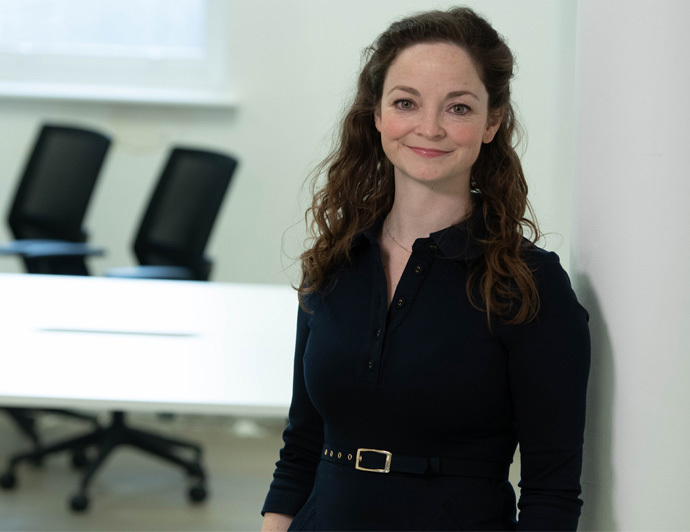Founder of ‘The Talent Foundry’, Amy Leonard MBE, talks to Odgers Berndtson about their inception, impact and the future of social mobility in the UK.
Over the past 12 years, The Talent Foundry has worked with over 750,000 young people from disadvantaged backgrounds, providing opportunities that aim to inspire and engage them, ultimately helping them discover their skills and talent. In this interview, Amy tells us how it began and what stills need to be done.
Where did the idea for The Talent Foundry come from?
Amy Leonard: Back in 2009, I was working in Government on a huge capital investment programme to rebuild every secondary school in the country, starting with those in the most disadvantaged communities. It was a programme with enormous ambition in terms of infrastructure, but it was clear to me that students who attended the most disadvantaged schools needed more than just a new building. The teachers who work in these schools do the most incredible job, but what is often missing are the types of opportunities and access to networks that young people from more affluent backgrounds are able to take for granted. It is these opportunities and networks that instil a sense of self-belief and confidence.
I decided to set up the Talent Foundry (or the Transformation Trust as we were then called) to fund the types of opportunity that you would see in some of the best independent schools in the country – but making these available to the kids that need the greatest help and would benefit the most.
I have always been driven by a belief that everyone has something they are amazing at, they just need to find out what it is. What we are trying to do is provide the opportunities, so that the students we work with can figure out what they are amazing at.

How has The Talent Foundry influenced and impacted Social Mobility in the UK since your inception in 2009?
AL: There are all sorts of great charities out there operating in the education sector, but we are one of a tiny number that focuses solely on schools in areas of high socio-economic disadvantaged AND nationally, right across the country.
Over the years, we have delivered programmes to over three-quarters of a million young people. Every year, we are working with around 60,000 young people from across 1,600 secondary schools.
We have worked with some of the largest and best-known UK companies and organisations to deliver world-class programmes designed to help young people develop their skills and confidence. We have taken groups of sixth formers out to the US to take part in the general elections and into the White House, and we have taken groups of teenagers to climb Kilimanjaro. And in non-Covid years, we host ‘Rock Assembly’, a unique careers fair and pop concert mash-up for 10,000 teens at Wembley – good for the soul, but hard on the ears! This year the ‘Rock Assembly’ is going virtual, but I am as excited as ever about what we have lined up.
What do the next 5 years hold for you?
AL: I am incredibly proud of what the team has achieved over the years, but there is always more work to be done. We are always reaching out to new corporate partners to work with and to design outreach programmes that meet their needs, creating diverse pipelines of talent for their future workforce. More and more organisations are truly understanding the benefits of having an inclusive workforce, and it is exciting to be part of those
conversations.
Specifically, the next five years will see us rolling out our ‘Bridge’ series of programmes. Designed for school leavers during their last year of school, the ‘Bridge’ aims to get students ‘match-fit’ for an apprenticeship role – through a series of six skill-based sessions, typically taking place at the corporate head office – students are put through their paces to hone their skills, so they are ready to compete with their more affluent peers to secure
these positions.
We are fundraising right now and speaking to all sorts of companies who want to support this programme.
Our ambition is to train 5,000 school leavers over the next five years and help them secure a minimum of 1,000 roles with our corporate partners.
What was the impact of Covid on social mobility, and where does that leave social mobility charities and organisations such as The Talent Foundry?
AL: Clearly, this has been an unbelievably challenging period for everyone, but it is equally obvious that the schools and communities we work with have been hit particularly hard.
The disadvantage gap has grown dramatically – it took 10 years to narrow that gap by 10%, and it has been said that in the first 10 weeks of lockdown in 2020, it is thought that 10% of progress was destroyed.
So, we know we must work even harder to make sure young people from disadvantaged communities are not left further behind.
What is fascinating is that in a year when I fully expected our work to be paused, we continued to be just as busy as ever – which highlights how much the work we do is needed and how valued it is by the schools we work with.
The Social Mobility Commission recently commended the intent but said we are ‘no where near’ to narrow widening social inequalities within the UK. In your view, what core tools and policies are missing to successfully deliver on this intent?
AL: For me, this is all about opportunities – everyone has something they are amazing at, something that they could fly to the stars on, but they just need to discover it. The only way to do that is to try all sorts of things – so it follows that the more opportunities young people have, the more likely they are to discover the thing that makes their heart sing and mind buzz.
Schools are doing the most incredible job – I cannot stress this enough – but they are working flat out on the core subjects, which is exactly right and proper. It is incumbent on organisations like the Talent Foundry to bring to bear the power and commitment of the private sector.
You name a number of major organisations on your websites as partners including Dell, BT, KPMG, and NHS. What do you think makes them good advocates for social mobility?
AL: What has been so wonderful to see over the last 12 years is the genuine belief and commitment to social mobility from the companies we work with. We have long-standing relationships with organisations like Barclays and Dell precisely because they share our passion for helping young people discover their talents.
It is something that runs through the culture of an organisation too – the vast majority of our programmes involve significant employee volunteering opportunities so that students get the chance to meet and get to know “real” people in these firms. This is so powerful and unbelievably rewarding for both sides. We have serial volunteers who have even taken weeks of annual leave to do more volunteering as they have enjoyed it so much!
Looking forward, how can public & private sectors recognise and promote the potential of social mobility?
Firstly, it is about recognising the genuine value to the organisation of having a diverse workforce – and I do not just mean here ‘because it is the right thing to do’.
Of course, it is the right thing to do, but it has hard-edged business benefits too – so there is both a societal and an economic benefit to this.
Secondly, it is about role models. Finding the people in each organisation who have a story to tell – about their own life, the challenges they have overcome, how they dealt with something difficult in their past. These lived experiences really speak to young people and help them believe that they can achieve too. I have seen it again and again, and it never stops packing a powerful punch.
What is the best part of running The Talent Foundry and what are you most proud of?
AL: Gosh, where to start… it is an utter privilege, and I am really fortunate to have the most amazing team who make every programme something we are proud of. There are so many individual stories of young people who point to a programme they took part in being life-changing for them – that is the stuff that gives me shivers and makes me strive to work harder and form new partnerships so that we can do our bit to support even more young people.
Please continue reading to learn more about the Talent Foundry.
Authored by our Social Mobility Allies:
William Hogg, Principal at Odgers Berndtson
Emily Hudson, Consultant at Berwick Partners
Grant Speed, Managing Director at Odgers Interim



